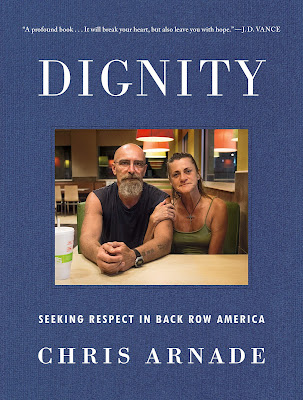Chris Armade was from 'front row America' - he was a Wall Street banker and part of the elite who ran the country. Then he took a long trip across the nation to visit the people of 'backrow America', the sex workers, the alcoholics, the drug addicts, the homeless, the urban poor.
He took his camera and he photographed them (they loved to be photographed) and he listened and he listened and wrote it all down in his extraordinary: 'Dignity, Seeking Respect in Backrow America.'
The subtitle came from what he discovered: these people at the bottom of the pile valued their dignity above all things and did everything they could to uphold it, even in the most trying conditions. And he came to see their dignity and to value it.
There were two places where he knew he could always find the 'backrow people' , two places where they loved to go and where they would always gather: McDonald's and the churches.
In every place they gathered at McDonalds. It was always open, the food was cheap, it was warm, there was free WiFi, you could use the bathrooms and have a wash. It was the place where you could meet your friends. When Armade asked street people where they would like to meet him for a chat they always said 'McDonalds.'
Front row America sneered at McDonalds and laughed at those who ate there and worked there. But back row America loves the big M.
Every week on his journey Armade, a self-confessed atheist, went to a backrow church, often small, often meeting in a storefront or near derelict industrial building, usually evangelical or pentecostal, a church led by the people for the people.
Armade says 'I kept finding myself in churches, as I kept finding myself in McDonalds, because the people I wanted to learn from, spent their time there.'
Why do the backrow people prefer the churches to the community centres, the welfare offices, the other expressions of official America?
Here's what Armade says: 'They walk inside the church and immediately they meet people who get them. The preachers and congregants inside may preach to them and even judge their past decisions, but they don't look down on them. They have walked the walk and know.... (what) they are going through...from their own lives or the lives of their friends. They look like them and they get them.'
And then Armade, who by now has moved from being an atheist to being an agnostic - I think because he can no longer say there is nothing in this what these people believe (even though he doesn't share their beliefs himself he doesn't want to negate them entirely) - has this brilliant paragraph:
'There are rules to follow if you join, but they don't require having your paperwork in order, having proper ID. They don't require getting grilled about this and that. They say "enter as you are," letting forgiveness wash away a past that many want gone. You are welcome as long as you try. The churches understand the streets, understand that everyone is a sinner, and everyone fails. In their minds, the rest of the world - the courts, the hospitals, the rehab clinics, the welfare office, police stations and even some of the nonprofits and schools...doesn't understand them. The cold, secular world of the well-intentioned is a distant and judgmental thing. The world has given them seemingly nothing but pain'
'This is how it is on the streets. Faith is the reality and the source of hope.'
In one church Armade visits, 'everyone in attendance takes a turn at the front either singing, reading, preaching or chanting.' A man walks round 'calling out scriptures like an auctioneer,' children read out little speeches handwritten on lined paper, a man says 'I used to drink all the time until I discovered the Lord...I've been free from booze for fourteen years' and a woman tells the congregation 'I have had it rough, but with you and the Lord, I will keep my head up high' and then three women sing:
Get up, get up, get up in Jesus name!
The Lord is calling daily to those who would be saved
Don't go down defeated while victory's here to claim
Get up, get up, get up in Jesus name
Oh at the gate called beautiful, they're laid out in the street
A poor and lowly beggar was crippled in his feet
As John and Peter passed him, they saw has need was bad
Well they had no gold and silver but they gave him what they had
At the end they all hug, shake hands, and then go out for a smoke.

No comments:
Post a Comment